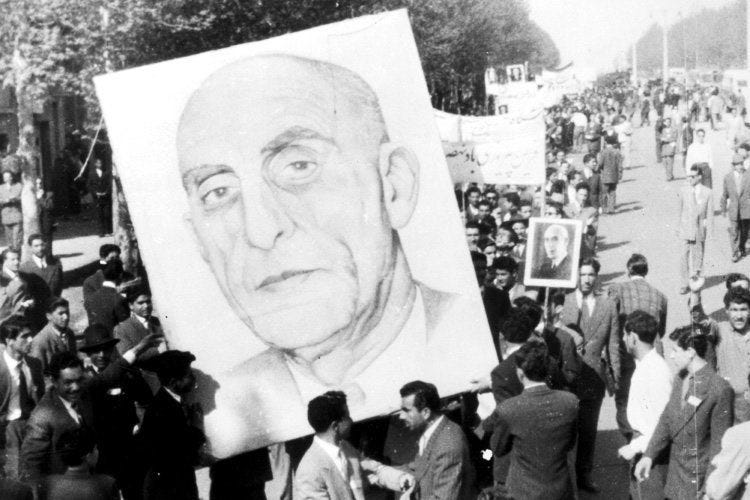Guerrilla History Newsletter #8
All the latest from the show, and reading/listening recommendations from our hosts and guests
Good afternoon Guerrilla History listeners!
Before we begin, we want to remind everyone that today marks 35 years since one of our heroes, Thomas Sankara, was assassinated in a Western-backed coup in Burkina Faso. In just four years, Sankara left a remarkable legacy, but despite (or because) of that, he was executed, dismembered, and dumped in an unmarked grave. The Western-backed coup government led by Blaise Compaoré quickly went about dismantling the achievements of Sankara’s Burkina Faso. We recommend taking time on this day to reflect on what Sankara was able to do, what could have been had he not been assassinated so early, and the role the West has in tragic events such as this. While there is many places to find good information about him, we highly recommend checking out the fantastic A Certain Amount of Madness: The Life, Politics and Legacies of Thomas Sankara.
We have a big roundup of our recent work, which we, as always, hope is useful for you to stay up to date! First, we will discuss the latest episodes we’ve released. In the last few weeks, we have three new releases, the first of which being the concluding Q&A portion of our Twitter Space on the topic Why Political Education and Historical Knowledge are KEY for Activism/Organizing (Part 2). The feedback we heard on this two-part episode was outstanding, and we really must thank all of our panelists once again for their wonderful contributions to the discussion. If you haven’t heard Part 1 yet, we of course would recommend checking that out first. Then, we’ve released two more episodes of our ongoing Sanctions As War series, which we’ve also heard very nice things about! The first of these episodes was a slightly more theoretical discussion with Professor Manu Karuka on Sanctions As Siege Warfare, which was an absolutely tremendous conversation that situated modern sanctions regimes within the longer history of siege warfare. Just yesterday, we released another case study within the series as well, one which is particularly timely at the moment. Professor Muhammad Sahimi joined us to talk about the History and Impacts of Sanctions on Iran, which not only is incredibly useful for understanding the last century of Iranian history, but also is important for understanding some of the roots of the current upheaval rocking Iran. We highly recommend listening to these episodes, and especially sharing our latest episode on sanctions and Iran, as many comrades could benefit from further understanding the recent history of the country as well as getting some insight to the material conditions driving processes there.
More from the hosts:
Adnan’s free Online Open Course titled The Crusading Society, is continuing, and takes place every Saturday at 9:30-11am Eastern Time. Be sure to register for this free course at his new website! If you don’t get the email after registering, check your spam folder. There you’ll find information on how to attend the course online, as well as recordings of previous lessons and course materials. A really tremendous resource!
Breht has been putting out fantastic material, as usual, on both Rev Left and The Red Menace! We will begin by rounding up the Rev Left Radio episodes that have been released since out last newsletter. First, and perhaps most importantly, Breht interviewed comrades of the Worker's Front of Ukraine (ML) on the Russia-Ukraine War, which was a supremely interesting and principled discussion (translated by our wonderful friend Katya, whom we owe a huge debt of gratitude to) on one of the most pressing events today. After that, Shawn and Aaron from Srsly Wrong joined Breht to discuss their brand new animated series exclusively on MEANS TV, "Papa & Boy", the themes of class and hierarchy therein, childhood from the child's perspective, the complexities of parenting under capitalism, and much, much more! This was followed by Lyndon LaRouche: A Warning & Lesson For the Communist Left, wherein Donald Parkinson from Cosmonaut Magazine joined Breht to talk about the life, political theory, and legacy of Lyndon LaRouche. Most recently, Breht released Red Valkyries: Feminist Lessons from Five Revolutionary Women, which featured returning Rev Left fan favorite Kristen Ghodsee on her latest book. Interspersed were a couple of very short (literally a few minutes at most) Red Hot Shots, on From Each According to Their Ability, To Each According to Their Needs and Equality of Opportunity vs. Equality of Outcome, which each would be great little explainers for people just getting into left-politics. Moving on to The Red Menace, Alyson and Breht released an outstanding episode MAGA Communism: Opportunism, Social Chauvinism, and Terminally Online Tailism, which is a direct response to some of the clownishness within social media discourse these days. It goes without saying that we’re also highly recommending this!
The Reading List
Time for this week’s reading/listening list! To find the article/episode, just click on the name and the link will take you to it! If you want to go back to the episode(s) of Guerrilla History that the guests have appeared on, simply click on their name and you will be directed straight to the episode.
Henry Hakamaki:
Laundering Black Rage by Too Black in Black Agenda Report is an analysis of the means by which black rage, which otherwise could be utilized for revolutionary means, is laundered in favor of other ends. Including a discussion of the 2020 uprisings and their eventual laundering and more, this is a highly interesting piece that we plan on releasing a patreon crossover episode with the author very soon!
The Question of Proletarian Internationalism: Che Guevara’s The African Dream by Joseph Mullin in Liberated Texts is a review of Che Guevara’s The African Dream, his diary of his incusion in Congo-Kinshasa during the Simba Rebellion (1963-65). Joseph is one of the members of The Cadre Journal, which we have an episode coming out with very soon!
Economics and politics for liberation: an interview with Ndongo Sylla in The Review of African Political Economy (conducted by Leo Zeilig, who is a former GH guest on our Intro to African Revolutions and Decolonization episode) is a discussion about Sylla’s excellent scholarship (we hope to bring him onto the show in the future!), French imperialism in Africa, and the necessities and potentialities of economic and political liberation on the continent.
Amanda Yee of Radio Free Amanda:
Five of the worst climate crisis disasters this summer by Amanda herself in Liberation News, described by her as follows: “From droughts to heat waves to severe rainfall and flooding, this summer saw extreme weather events across the globe induced by the ever-worsening climate crisis. These five events reveal the stark inequality of climate change: it is a crisis. created by the capitalist class in the wealthy countries, but it is poor and working people throughout the world who will suffer its fallouts. This is an article I wrote about a few of the worst climate crises this summer, and how they were made worse, if not directly caused by capitalism.”
Four straight years of nonstop street protest in Haiti in People’s Dispatch. According to Amanda, “The people of Haiti are demonstrating against fuel shortages and rising costs of living. Make no mistake: this is a crisis of neocolonialism. The US-led Core Group installed Haiti’s current president Ariel Henry and has dismantled the state, replacing it with Western NGOs who squander relief and aid money meant for the Haitian people. The country is also currently under occupation by UN security forces. These two articles give a really great analysis of how Western colonialism of the country since its revolution in 1804 has brought it to the point where it is today.”
The "leftism" of the Americas collapses at the door of Haitian sovereignty in Black Agenda Report, which discusses the dismissal of Haitian sovereignty in global discourses. The author of this piece is the excellent Jemima Pierre, who we hope to bring onto Guerrilla History soon to discuss Haiti, so stay tuned for that!
Alexander Aviña:
Anticolonial Eruptions: Racial Hubris and the Cunning of Resistance, by Geo Maher , which is described by the publisher as follows: “In Anticolonial Eruptions, Geo Maher diagnoses a paradoxical weakness built right into the foundations of white supremacist power, a colonial blind spot that grows as domination seems more complete. Anticolonial Eruptions argues that the colonizer’s weakness is rooted in dehumanization. When the oppressed and excluded rise up in explosive rebellion, with the very human demands for life and liberation, the powerful are ill-prepared. This colonial blind spot is, ironically, self-imposed: the more oppressive and expansive the colonial power, the lesser-than-human the colonized are believed to be, the greater the opportunity for resistance. Maher calls this paradox the cunning of decolonization, an unwitting reversal of the balance of power between the oppressor and the oppressed.”
Market Civilizations: Neoliberals East and South, eds. Quinn Slobodian and Dieter Plehwe introduces a range of characters and voices active in the transnational neoliberal movement from the Global South and Eastern Europe, and sees neoliberalism from beyond the industrial core to help us understand what made radical capitalism attractive to diverse populations.
"From inside the US' most secure prison, El Chapo is pointing fingers at what he says are the real powers in the drug trade," by Luis Chaparro, wherein El Chapo reveals a structural feature of the international drug game: the deep collaboration between narcos and political and economic elites.
We have many more exciting things coming soon, both in terms of episodes as well as expansions to what we are able to do! You can help support the show at Patreon, which will allow us to continue expanding our resources that we make available, but the most important thing is that we help educate as many people as we can. Use the button below to get this newsletter into your inbox, and until next time, solidarity.





